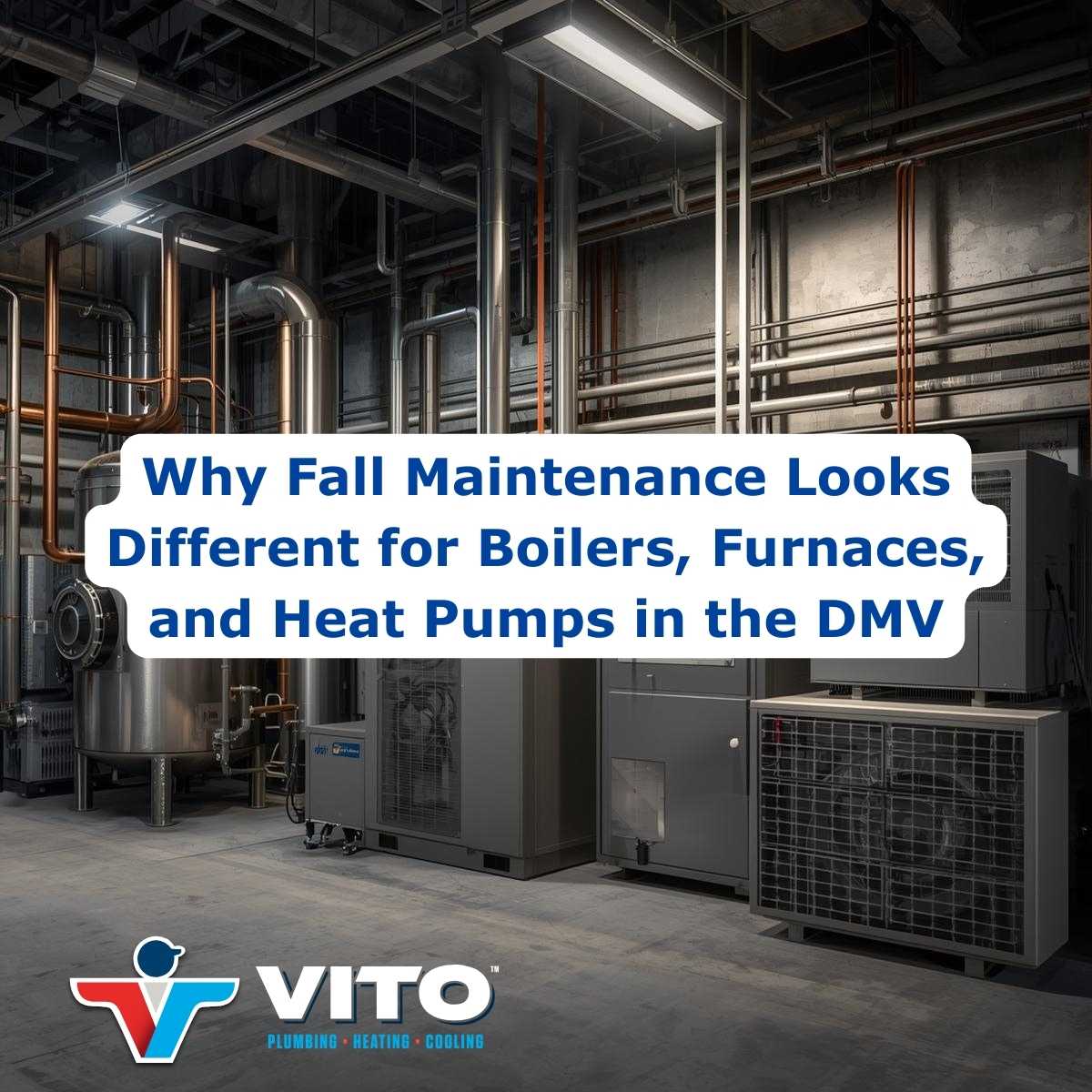
Spring maintenance for cooling systems is fairly straightforward. Whether you have an air conditioner or
a heat pump, the tasks are almost identical because the systems share many of the same components.
Heating is different. Furnaces, boilers, and heat pumps all provide heating in very different ways, with
major differences in fuel source, operation, and lifespan.
What they do have in common is the need for pre-season maintenance. The issues that cause problems
may vary, but in all cases, early detection is the best way to avoid mid-winter breakdowns.
Boiler Fall Maintenance
Boilers are still a relatively common heating solution in many older single-family homes, rowhouses, and
multi-family properties throughout DC, Maryland, and Virginia. And unlike furnaces or heat pumps,
boilers are often kept in service for 30–50 years. Although old boilers are notoriously inefficient, they
can continue operating for a very long time.
Most of their problems, such as scale buildup inside the heat exchanger, circulator pump wear, and
corroded pressure relief valves, happen gradually, not suddenly. Without regular upkeep, those gradual
issues turn into emergency calls on the coldest day of the year.
Fall boiler maintenance usually includes:
- A combustion inspection to confirm burners are working properly and safely.
- Cleaning of burners and flue passages.
- Checking all safety controls and relief valves.
- Flushing or descaling the system every 2–3 years to control mineral buildup.
The payoff is long life. Boilers can function well for many decades if maintained properly, but neglect
accelerates corrosion and scale, cutting that lifespan and efficiency dramatically.
Furnace Fall Maintenance
Gas furnaces are the most common heating system we see in suburban single-family homes across
Maryland and Virginia. Their 15–25 year lifespan isn’t as long as boilers, but they can provide reliable
comfort if they’re serviced annually.
Most of the no-heat calls we receive for furnaces in December and January are linked to simple issues
that could have been spotted during fall service. A dirty flame sensor can shut the burners down. A weak
igniter can fail without warning. Dust buildup on the blower wheel makes the motor work harder, which
can cause overheating or motor failure.
Fall furnace maintenance focuses on catching those problems early before they cause breakdowns.
Maintenance checks and service typically include:
- Checking and replacing filters.
- Testing ignition components and cleaning the flame sensor.
- Inspecting the blower motor and blower wheel.
- Checking the heat exchanger for cracks or corrosion.
Unlike boilers, furnaces tend to show wear through short-cycling, inconsistent airflow, or rising energy
bills. Seasonal maintenance keeps those warning signs from turning into an emergency repair when you
least expect it.
Heat Pump Fall Maintenance
The efficiency and flexibility of heat pumps have made them the fastest growing heating solution. Many
homeowners can consolidate their central heating and cooling into a single unit by switching to a heat
pump. Ductless heat pumps can supplement additions or be added to rooms that are not adequately
served by central air.
There is one downside to the consistent, efficient temperature control provided by heat pumps: they
never get a break. Unlike furnaces or boilers, heat pumps run year-round, pulling double duty for cooling
in the summer and heating in the winter.
Because they operate continuously, small issues can worsen faster. Dirty coils reduce efficiency,
refrigerant leaks strain the compressor, and a faulty defrost board can leave the outdoor unit encased in
ice. Letting these issues persist may reduce the operating life of your system or lead to a total loss of
heating during a cold December or January night.
Important fall heat pump maintenance tasks include:
- Inspecting and cleaning both the outdoor condenser coil and indoor evaporator coil.
- Checking refrigerant pressures and line insulation.
- Testing the defrost board and controls.
- Inspecting electrical components for wear or loose connections.
Skipping these checks can mean your system enters winter already running behind, leading to higher
bills and an increased chance of mid-season failure.
A DMV HVAC Company That Has Seen and Serviced It All
Whether your home relies on a boiler, furnace, or heat pump, fall maintenance is the key to avoiding
breakdowns when the first real cold snap hits. At Vito Services, our licensed HVAC technicians service
every type of system used in the DMV. From cleaning burners and coils to checking ignition systems and
safety controls, we make sure your equipment is ready for the months ahead.
Don’t wait until your heating system quits on the coldest day of the year. Call 301-251-0211
and leave it
to Vito.








